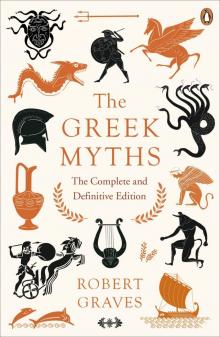- Home
- Robert Graves
I, Claudius c-1 Page 12
I, Claudius c-1 Read online
Page 12
Those were her last words, my friends. She died a few minutes later. I hurried here as soon as I Had changed my clothes. You will forgive me."
I burst into tears and began to sob hysterically. My mother, furious at my disgraceful conduct, told one of the freedmen to lead me away to my room; where I remained for days, in a nervous fever, unable to eat or sleep. But for the comfort that dear Postumus gave me, I believe I should have lost my wits altogether. The murderess was never found and nobody was able to explain what motive she could have had. Livia reported to A'ugustus a few days later that according to reports which seemed reliable one of the women in the crowd had been a Greek girl who considered herself, no doubt groundlessly, to have been wronged by the girl's uncle and may have decided to revenge herself in this monstrous way.
When I was well again, or no iller than usual, Livia complained to Augustus that the death of young Medullina Camilla had happened most unfortunately. In spite of Augustus' pardonable sentiment against such a match, she feared that young ^Emilia would, after all now, have to be betrothed to her impossible grandson: everybody, she said, had been surprised that she had not been matched with him before. So, as usual, Livia had her way. I was betrothed to Emilia a few weeks later; and went through the ceremony without disgrace, because grief for Camilla had made me quite indifferent. But -Emilia's eyes were red when she arrived, from tears not of grief but of rage.
Now as to Postumus, poor fellow, he was in love with my sister Livilla, of whom he saw much because she had gone to live in the Palace when she married his brother Gaius, and was still there. It was generally expected that he would marry her, to renew the family connexion broken by his brother's death. Livilla was flattered by his passionate devotion. She flirted with him constantly, but had no love for him. Castor was her choice--a cruel, dissolute, hand--some fellow who seemed made for her. I knew of the understanding between Livilla and Castor, which I had discovered accidentally, and this made me very unhappy on Postumus'
behalf, the more so because Postumus had no suspicion of her character and I did not dare to tell him of it. Whenever Livilla and I and he were together she used to show me pretended affection, which touched Postumus as much as it angered me.
I knew that as soon as he had gone she would begin her spiteful tricks again. Livia got wind of the intrigue between Livilla and Castor and kept a careful watch on them: one night she was rewarded by a message from a trusted servant that Castor had just climbed in at Livilla's window by the balcony. She put an armed guard on the balcony and then knocked at Livilla's door, calling her by name. After a minute or so Livilla opened the door, pretending to have been sound asleep; but Livia went inside and found Castor behind the curtain. She talked very plainly to them and appears to have made them understand that the matter would not be reported to Augustus, who would certainly banish them if it was, only on certain conditions; and that if these same conditions were strictly observed she would even arrange that they should marry. Not long after my betrothal to ^Emilia, Livia so settled matters with Augustus that Postumus was betrothed, much to his grief, to a girl called Domitia, a first-cousin of mine on my mother's [A.D. 4] side; and Castor married Livilla. This was the year that Tiberius and Postumus were adopted as Augustus' sons.
Livia considered Julilla and her husband /Emilius as a possible obstacle to her designs. She was lucky enough to get evidence that ^Emilius and Cornelius, a grandson of Pompey the Great, were plotting to remove Augustus from power and to divide up Bis offices between themselves and [99] certain ex-Consuls, among them Tiberius, though Tiberius had not yet been sounded for his opinion. The plot never gathered much way, because the first ex-Consul whom jEmilius and Cornelius approached refused to have anything to do with it. Augustus did not punish either ^Emilius or Cornelius by death or banishment. It had been welcome proof of the strength of his own position that they could get so little support for their plot, and by sparing them he proved it still stronger. He merely called them to his presence and lectured them on their folly and ingratitude. Cornelius fell at his feet and thanked him abjectly for his clemency; and Augustus begged him not to make a further fool of himself. He was not a tyrant, he said, either to conspire against, or to worship for showing a tyrant's clemency: he was merely a State-official of the Roman Republic who had been temporarily granted wide powers for the better maintenance of order. ^Emilias had evidently led him astray by misrepresentations. The best cure for this nonsense was for Cornelius to become Consul next year in due course and so satisfy his ambitions by attaining equal honour with himself; for there was no higher rank than Consul in Rome.
[Theoretically this was true.]
^Emilius was proud and remained standing; and Augustus told him that as his relative by marriage he ought to have shown more decency, and as an exConsul he ought to have shown more sense. He thereupon deprived him of all his honours.
An amusing feature of this case was that Livia won all the credit for Augustus' clemency by claiming to have pleaded, with a woman's tenderness, for the lives of the two conspirators; of whom, she said, Augustus had practically decided to make an example. She got his consent to the publication of a little book which she had written called A Pillow Debate on Force and Gentleness, full of intimate touches. Augustus is represented as restless and worried and unable to sleep. Livia begs him prettily to speak his mind and they go together over the question of the proper treatment of /Emilius and Cornelius.
Augustus explains that he does not wish to put them to death, yet he fears that he must do so, for if he lets them off it will be thought that he is afraid of them, and others will be tempted to conspire against him. "To be always under the necessity of taking vengeance and inflicting punishments is a very painful position for any honourable man to be in, my dearest wife."
Livia answers: "You are quite right and 1 have a piece of advice to give you--that is, if you are willing to accept it and will not blame me for daring, though a woman, to sug-s gest to you something which nobody else, even of your most intimate friends, would dare to suggest."
Augustus says: "Out with it, whatever it is."
Livia answers: "I will tell you without hesitation, because I have an equal share in your good fortune and ill fortune and as long as you are safe I also have my part in reigning; whereas if you come to any harm, which the Gods forbid, that is the end of me too...." She advises forgiveness. "Soft words turn away wrath, as harsh words excite wrath even in a gentle spirit; forgiveness will melt the most arrogant heart, as punishment will harden even the humblest.... I do not mean by this that we must spare all criminals without distinction: for there is such a thing as an incurable and persistent depravity on which kindness is wasted. A man who offends in this way should be removed at once as a cancer in the body politic. But in the case of the rest, whose errors, committed wilfully or otherwise, are due to youth or ignorance or misapprehension, we should, I believe, merely rebuke them, or punish them in the mildest possible way. Let us make the experiment, therefore, starting with these very men." Augustus applauds her wisdom and confesses himself persuaded. But note the reassurance to the world that on Augustus' death Livia's rule would end, and further note and remember the phrase "incurable and persistent depravity". My grandmother Livia was a sly one!
Livia now told Augustus that the proposed marriage between ^Emilia and myself must be cancelled as a sign of Imperial displeasure with her parents; and Augustus was delighted to agree to this, because ^Emilia had been complaining bitterly to him of her misfortune in having to marry me. Livia had little to fear from Julilla now, whom Augustus suspected of being an accomplice in her husband's schemes: but she would make sure of her too, before [101] she had done. Meanwhile she had to pay a debt of honour to her friend Urgulania, a woman whom I have not yet mentioned but who is one of the most unpleasant characters in my story.
VIII
URGULANIA WAS LIVIA'S ONLY CONFIDANT AND BOUND TO her by the strongest ties of interest and gratitude. She had lost her husband, a partisan o
f Young Pompey's, in the Civil Wars and with her infant son had been sheltered by Livia, then still married to my grandfather, from the brutality of Augustus'
soldiers. Livia, on marrying Augustus, insisted that he should restore to Urgulania her husband's confiscated estates, and invite her to live with them as a member of the family. By Livia's influence--for in Augustus' name Livia could force Lepidus, the High Pontiff, to make whatever appointments she pleased--she was set in a position of spiritual authority over all the married noblewomen of Rome. I must explain that. Every year, early in December, these women had to attend an important sacrifice to the Good Goddess presided over by the Vestal Virgins, on the proper conduct of which would depend the wealth and security of Rome for the ensuing twelve months. No man was allowed to profane these mysteries on pain of death. Livia, who had put herself into the good graces of the Vestals by rebuilding their Convent, furnishing it in luxurious style, and winning them, through Augustus, many privileges from the Senate, suggested to the Chief Vestal that the chastity of some of the women who attended these sacrifices was not beyond suspicion.
She said that the troubles of Rome during the Civil Wars might well have been due to the Good Goddess' anger at the lewdness of those who attended her mysteries. She suggested further that if a solemn oath were to be given to any woman who confessed to a lapse from moral strictness that her confession would not be reported to anv ear of man, and thus not involve her in public disgrace, there would be a greater chance of the Goddess being served only by the chaste, and her anger appeased.
The Chief Vestal, a religiously-minded woman, approved of the idea but asked Livia's authority for this in-1 novation. Livia told her that she had seen the Goddess in a dream only the night before, and that she had asked that, since the Vestals themselves were not experienced in matters of sex, a widow of good family should be appointed Mother Confessor for this very purpose. The Chief Vestal asked whether the sins confessed should pass unpunished.
Livia replied that she could not have expressed an opinion had not the Goddess fortunately made a pronouncement on this point in the same dream: that the Mother Confessor would be empowered to prescribe expiatory penances and that the penances should be a matter of holy confidence between the criminal and the Mother Confessor.
The Chief Vestal, she said, would be informed merely that such-and-such a woman was unfit to take part in the mysteries of this year; or that such-and-such had now performed her penance. This suited the Chief Vestal well, but she was afraid to suggest a name for fear that Livia would turn it down. Livia then said that the High Pontiff was obviously the man to make the appointment, and that if the Chief Vestal permitted her, she would explain matters to him and ask him to name a suitable person, after performing the necessary ceremonies to ensure a choice favourable to the Goddess. So Urgulania was appointed, and of course Livia did not tell Lepidus or Augustus the powers that the appointment carried. She spoke of it casually as a position of advisory assistant to the Chief Vestal in moral matters,
"the Chief Vestal, poor woman, being so unworldly".
The sacrifice was customarily held at the house of a Consul, but now always at Augustus' palace, because he ranked above the Consuls. This was convenient for Urgulania, who made the women come into her room there [which was arranged in a way to inspire fear and truthfulness], bound them to tell the truth by the most frightful [i03] oaths, and when they had confessed, dismissed them while she considered the appropriate penanceLivia, who was in the room concealed behind a curtain, would then suggest one. The two got a great deal of amusement out of this game and Livia plenty of useful information and assistance in her plans.
As Mother Confessor in tlie service of the Good Goddess, Urgulania considered herself above the law. Later I shall tell how once, when summoned by a senator to whom she owed a large sum of money to appear before the magistrate in the Debtors' Court, she refused to obey the summons; and how, to avoid the scandal, Livia paid up. On another occasion she was subpoenaed as a witness in a Senatorial enquiry: having no intention of being cross-examined she excused herself from attending and a magistrate was sent to take her deposition down in writing instead. She was a dreadful old woman with a cleft chin and hair kept black with lamp-soot [the grey showing plainly at the roots], and she lived to a great age. Her son, Silvanus, had recently been Consul and was one of those whom ^Emilius approached at the time of his plot. Silvanus went straight to Urgulania and told her about yEmilius' intentions. She passed the news on to Livia and Livia promised to reward them for this valuable information by marrying Silvanus' daughter Urgulanffla to me and so allying them with the Imperial family.
Urgulania was in Livia's confidence and was pretty sure that my uncle Tiberius--not Postumus, though he was Augustus' nearest heir--would be the next Emperor: so this marriage was even more honourable than it seemed.
I had never seen Urgulanilla. Nobody had. We knew that she lived with an aunt at Herculaneum, a town on the slopes of Vesuvius, where old Urgulania had property, but she never came to Rome even on a visit. We concluded that she must be delicate. But when Livia wrote me one of her curt cruel notes, to the effect that it had just been decided at a family council that I should many the daughter of Silvanus Plautius, and that this was a more appropriate match for me, considering my infirmities, than the two previously projected, I suspected that there was something much more seriously wrong with this Urgulanilla than mere ill-health.
A cleft palate, perhaps, or a strawberry mark across half her face? Something at any rate that made her quite unpresentable. Perhaps she was a cripple like myself.
I wouldn't mind that. Perhaps she was a very nice girl really, but misunderstood.
We might have a lot in common. Of course, it would not be like marrying Camilla, but it might at least be better than marrying./Emilia.
The day was chosen for our betrothal. I asked Germanicus about Urgulanilla, but he was as much in the dark as I was, and seemed a little ashamed of having consented to the marriage without making careful enquiries beforehand.
He was very happy with Agrippina and wanted me to be happy too. Well, the day came, a "lucky" one, and there I was again in my chaplet and clean gown again waiting at the family-altar for the bride to arrive. "The third time's lucky,"
said Germanicus. "I am sure she's a beauty, really, and kind and sensible and just the sort for you." But was she? Well, in my life I have had many cruel bad jokes played on me, but I think that this was the cruellest and worst. Urgulanilla was--well, in brief, she lived up to her name, which is the Latin form of Herculanilla. A young female Hercules she indeed was. Though only fifteen years old, she was over six foot three inches in height and still growing, and broad and strong in proportion, with the largest feet and hands I have ever seen on any human being in my life with the single exception of the gigantic Parthian hostage who walked in a certain triumphal procession many years later. Her features were regular but heavy and she wore an almost perpetual scowl. She stooped. She talked as slowly as my uncle Tiberius [whom, by the way, she resembled closely--there was even talk of her being really his daughter]. She had no learning, wit, accomplishments, or any endearing qualities. And it is strange, but the first thoughts that struck roe when I saw her were: "This woman is capable of murder by violence" and "I shall be very careful from the first to hide my repugnance to her, and give her no just cause to harbour resentment against me. For if once she comes to hate me, my life is not safe."
I am a pretty good actor, and though the solemnity of the ceremony was broken by smirks, whispered jokes and repressed titters from the company, Urgulanilla had no [i°5] cause to blame me for this indecorousness. After it was over the two of us were summoned into the presence of Livia and Urgulania.
When the door was shut and we stood there facing them--myself nervous and fidgety, Urgulanilla massive and expressionless and clenching and unclenching her great fists--the solemnity of these two evil old grandmothers gave way, and they burst into uncontrolled laughter.
I had never heard either of them laugh like that before and the effect was frightening. It was not decent healthy laughter but a hellish sobbing and screeching, like that of two old drunken prostitutes watching a torture or crucifixion. "Oh, you two beauties!" sobbed Livia at last, wiping her'eyes, "What wouldn't I give to see you in bed together on your wedding night!
It would be the funniest scene since Deucalion's Flood!"
"And what happened particularly funny on that famous occasion, my dear?"
asked Urgulania.
'"Why, don't you know? God destroyed the whole world with a flood, except Deucalion and his family, and a few animals that took refuge on the mountain tops. Haven't you read Aristophanes' Flood? It's my favourite play of his. The scene is laid on Mount Parnassus. Various animals are assembled, unfortunately only one of each kind, and each thinks himself the sole survivor of his species. So in order to replenish the earth somehow with animals they have to mate with one another in spite of moral scruples and obvious difficulties. The Camel is betrothed by Deucalion to the She-Elephant."
"Camel and Elephant! That's a fine one!" cackled Urgulania. "Look at Tiberius Claudius' long neck and skinny body and long silly face. And my Urgulanilla's great feet and great flapping ears, and little pig-eyes! Ha, Ha, Ha, Ha!
And what was their offspring? Giraffe? Ha, Ha, Ha, Ha!"
"The play doesn't get that far. Iris comes on the stage for the messenger speech and reports another refuge of animals on Mount Atlas. Iris breaks off the nuptials just in time."
"Was the Camel disappointed?"
"Oh, most bitterly."
"And the Elephant?"
"The Elephant just scowled."
"Did they kiss on parting?'*
"Aristophanes does not tell. But I'm sure they did.
Come on, Beasts. Kiss!"
I smiled foolishly, Urgulanilla scowled.

 The Greek Myths, Volume2
The Greek Myths, Volume2 The Anger of Achilles: Homer's Iliad
The Anger of Achilles: Homer's Iliad Count Belisarius
Count Belisarius The Twelve Caesars
The Twelve Caesars Complete Poems 3 (Robert Graves Programme)
Complete Poems 3 (Robert Graves Programme) Homer's Daughter
Homer's Daughter The White Goddess
The White Goddess Goodbye to All That
Goodbye to All That Claudius the God and His Wife Messalina
Claudius the God and His Wife Messalina The Greek Myths
The Greek Myths I, Claudius
I, Claudius The Islands of Unwisdom
The Islands of Unwisdom Complete Short Stories
Complete Short Stories The Golden Fleece
The Golden Fleece They Hanged My Saintly Billy
They Hanged My Saintly Billy King Jesus
King Jesus Sergeant Lamb's America
Sergeant Lamb's America Hebrew Myths: The Book of Genesis
Hebrew Myths: The Book of Genesis Seven Days in New Crete
Seven Days in New Crete Proceed, Sergeant Lamb
Proceed, Sergeant Lamb Claudius the God
Claudius the God Wife to Mr. Milton
Wife to Mr. Milton The Complete Poems
The Complete Poems The Anger of Achilles
The Anger of Achilles Claudius the God c-2
Claudius the God c-2 Hebrew Myths
Hebrew Myths I, Claudius c-1
I, Claudius c-1 The Greek Myths, Volume 1
The Greek Myths, Volume 1